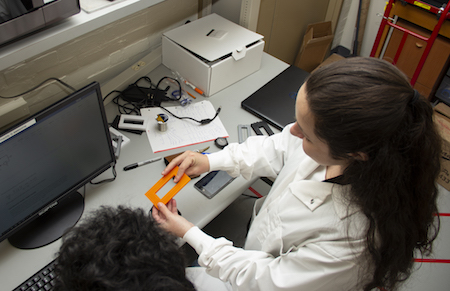We have a Wimmer
Jul 1, 2020

Source: College of Engineering
Victoria Webster-Wood heads the Biohybrid and Organic Robotics Group.
Victoria Webster-Wood, an assistant professor of mechanical engineering at Carnegie Mellon University, has been named a 2020-2021 Wimmer Faculty Fellow by the Eberly Center for Teaching Excellence & Educational Innovation.
These fellowships are made possible by a grant from the Wimmer Family Foundation and are designed for junior faculty members interested in enhancing their teaching through concentrated work designing or re-designing a course, innovating new materials, or exploring a new pedagogical approach.
Fellows work in close collaboration with the Eberly Center colleagues and receive a stipend to acknowledge the work it takes to improve one's effectiveness as an educator.
Webster-Wood plans to design interactive demonstrations and to build virtual labs for the course “Gadgetry: Sensors, Actuators, and Processors.” Demonstrations and labs will leverage active learning to help students connect mathematical and mechatronics concepts to the real world.
The virtual labs will allow enrolled students to troubleshoot measurable outputs, such as voltage and current, that industry experts have identified as essential skills for mechanical engineering graduates. Questions that accompany the labs will also ask students to report on their thinking and decision-making strategies. Webster-Wood hypothesizes that these demonstrations and labs will improve students’ mechatronic intuition.>
These types of educational materials are even more important now in light of our current health crisis. My goal is to bring an experiential hands-on mechatronics education right to the student, wherever they may be.
Victoria Webster-Wood, Assistant Professor, Mechanical Engineering
“As a Wimmer Faculty Fellow I will be working with our education experts at the Eberly center to develop virtual mechatronics labs and demonstrations. These types of educational materials are even more important now in light of our current health crisis,” said Webster-Wood. “My goal is to bring an experiential hands-on mechatronics education right to the student, wherever they may be.”
“In an educational format where some or even all classroom education must be remote, the ability to provide mechatronics students with meaningful activities that ensure they learn how to analyze a debug real-world mechatronic problems remains critical,” she explained. “Although in our Gadgetry course we ensure students have physical materials for at home prototyping, the interactive learning experience is disrupted by the limited ability for the teaching team to physical interact with the student’s circuits.”
“By supplementing physical prototyping with virtual labs and demonstrations we can ensure that we can guide and assess students ability to debug problems in existing circuits and redesign circuits for specific needs.”
Webster-Wood heads the Biohybrid and Organic Robotics Group . She also holds a courtesy appointment in the Department of Biomedical Engineering.
Media contact:
Lisa Kulick
lkulick@andrew.cmu.edu